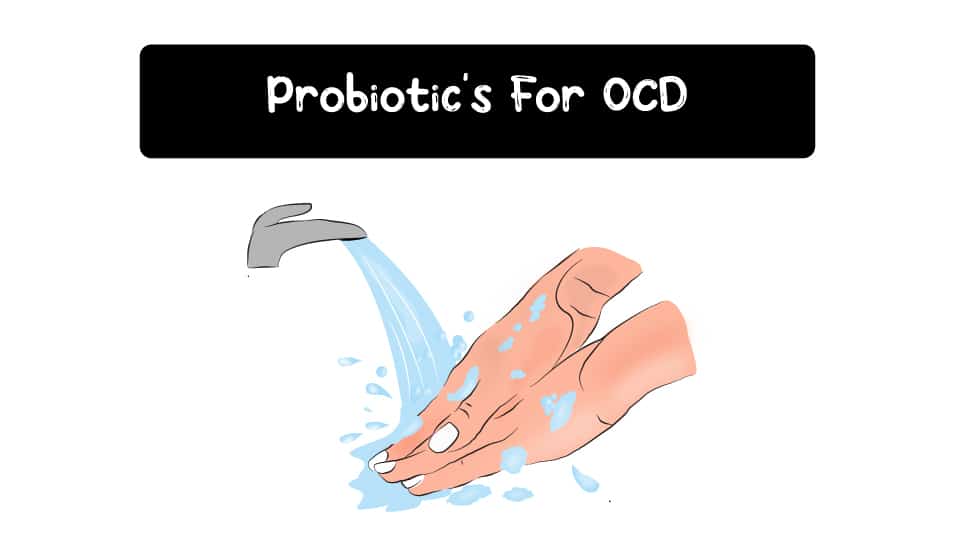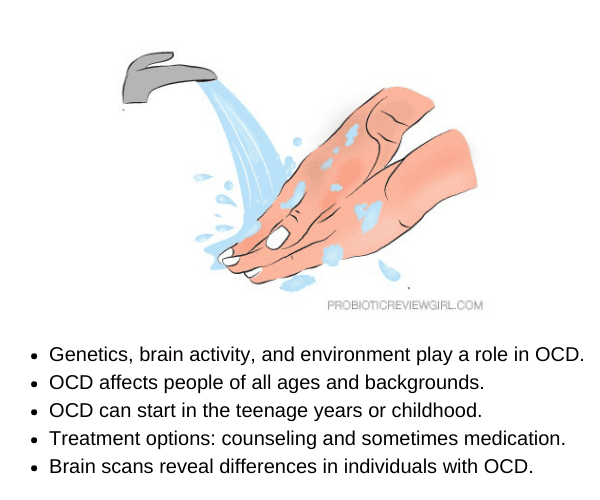Can Probiotics Help With OCD Symptoms? Yes, They Can

Probiotics may be able to alleviate OCD symptoms according to BMJ. Probiotics are live microorganisms, usually beneficial bacteria or yeasts, that are consumed to promote a healthy balance of gut microbiota and potentially provide various health benefits.
Obsessive-Compulsive Disorder (OCD) is a mental health condition characterized by persistent, intrusive thoughts (obsessions) and repetitive behaviors or mental acts (compulsions) aimed at alleviating anxiety or distress. In the past 365-days it's thought that 1.2% of the US Adult population has had OCD according to NIMH.
What Is OCD?
Obsessive-Compulsive Disorder (OCD) is a common, chronic, and long-lasting mental health disorder characterized by uncontrollable, recurring thoughts defined as obsessions and behaviors defined as compulsions that individuals feel compelled to repeat. OCD can affect people of all ages and backgrounds. It involves a pattern of unwanted thoughts and fears that lead to repetitive behaviors. OCD is not about being tidy but rather about having no control over negative thoughts and actions. OCD is considered an anxiety disorder that can be treated with counseling and sometimes medication according to IOCDF.

The causes of OCD are thought to involve a complex interplay of genetic, neurological, cognitive, and environmental factors. The exact cause of Obsessive-Compulsive Disorder is not fully understood. Experts believe that a combination of factors, including genetics, brain abnormalities, and environmental influences, may contribute to the development of OCD. It is noted that OCD often begins in the teenage years or early adulthood but can also manifest in childhood. Brain scans have shown differences in brain activity in individuals with OCD, suggesting a neurological component according to a 2013 study authored by Q Fan.
Can Gut Issues Cause OCD?
Yes, Gut issues can cause OCD because of the way the gut and brain are connected. The gut-brain axis, involving bidirectional communication between the gut and brain through various pathways, highlights the significant impact of gut microbiota on mood, cognition, and mental health according to a 2018 study authored by J Appleton.
Alterations in the gut microbiota, possibly triggered by factors like stress, excessive antibiotic use, or microbial imbalances, may contribute to the development or exacerbation of OCD symptoms according to a 2021 study authored by D Marazziti
OCD patients had bacteria lower species in their gut microbiome and abundance of certain beneficial bacteria according levels of C-reactive protein, an inflammatory marker, were elevated in OCD patients according to a 2020 study authored by J Turna.
Can Probiotics Help OCD?
Yes, probiotics have been investigated as a potential approach to easing OCD symptoms, as they may have the potential to address gut-related factors contributing to OCD. While some promising results have been observed in animal studies, comprehensive clinical trials in humans are still limited.
Best Probiotics For OCD
The best probiotics for OCD are Lactobacillus rhamnosus GG®, Lactobacillus casei Shirota, Bifidobacterium longum Rosell-175 and Lactobacillus acidophilus Rosell-52.
Can OCD Cause Anxiety?
Yes, OCD can indeed cause anxiety because it causes irrational and disturbing thoughts called obsessions, which can lead to significant anxiety. The relationship between OCD and anxiety, indicating that stress and anxiety can exacerbate OCD symptoms, although they are not the sole cause of the disorder according to a 2015 study authored by GM Goodwin.
Anxiety is a persistent emotional state characterized by unease, apprehension, and worry, often accompanied by physical symptoms like increased heart rate and restlessness. Probiotics can alleviate anxiety by promoting a healthy gut microbiome, which can have a positive impact on the brain-gut axis and overall mental well-being.
How To Take Probiotics For OCD?
You should take probiotics first thing in the morning on an empty stomach before breakfast for best OCD results. Other tips encompass a range of approaches, from psychological strategies such as cognitive-behavioral therapy to self-help techniques and lifestyle changes. Seeking support, managing stress, understanding the condition, and challenging obsessive thoughts and compulsive behaviors are also important a long side probiotic usage.
Dr. Sara Mesilhy has a Master’s degree in Gastroenterology and holds a membership with the Royal College of Physicians of the United Kingdom. She completed her Bachelor of Medicine, Bachelor of Surgery (MBBS) at Cairo University and is currently part of the ProbioticReviewGirl medical team.